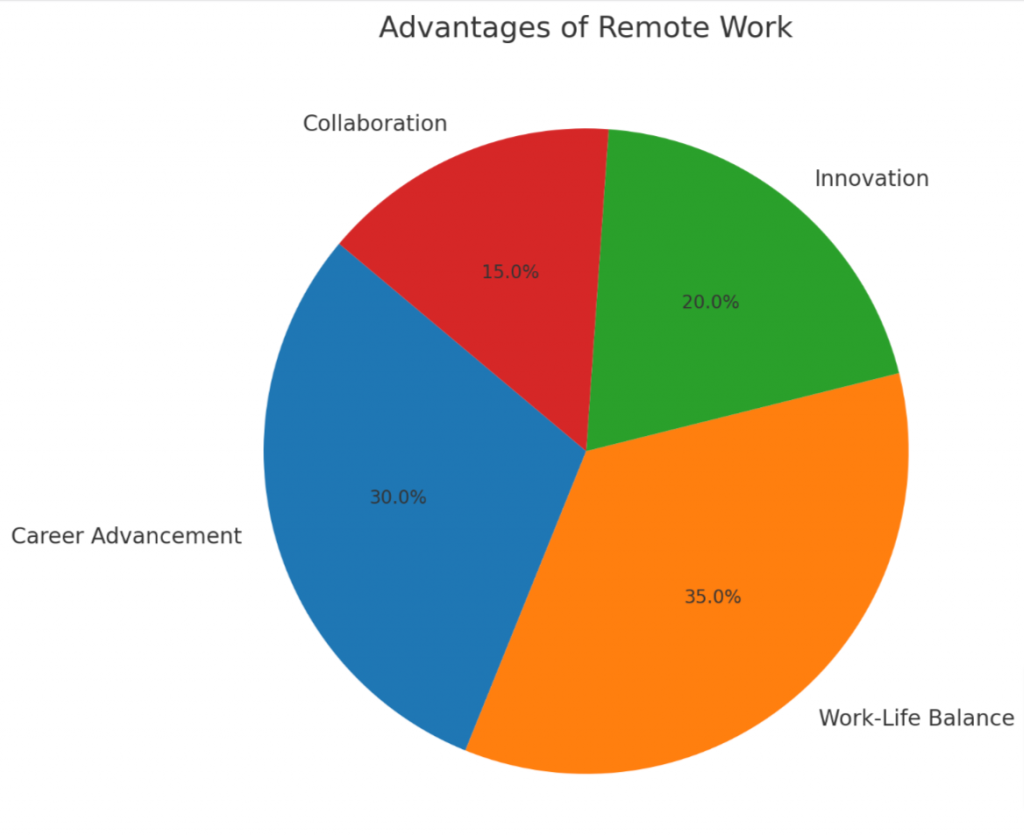Separating Fact from Fiction: Debunking Myths About Remote Social Media Jobs
Are you considering a remote job in social media but can’t shake off some prevailing myths? A Stanford study revealed that working remotely increases employee performance by 13%. In this blog, we’ll debunk seven common misconceptions about remote social media jobs and provide insights to help you navigate this career path successfully.
Dive in and let’s separate myth from reality together!
Key Takeaways
- Remote social media jobs are productive, with a 13% increase in employee performance.
- Remote work does not kill company culture and encourages collaboration through digital tools and recognition of good work.
- Remote social media jobs foster innovation and creativity by providing platforms for brainstorming sessions and instant messaging apps for idea sharing.
- Remote work in the social media field offers career advancement opportunities, higher job satisfaction, reduced stress levels, and improved work-life balance.
Myth #1: Remote Social Media Jobs Aren’t Productive
Many people believe that employees working remotely in social media jobs are not as productive as those working in a traditional office setting. However, research contradicts these assumptions.
Data from a Stanford study reveals that remote work boosts employee performance by an impressive 13%. Similarly, a FlexJobs survey found that most workers – around 65%, feel more productive when they’re not confined to conventional workplace environments.
The benefits of remote work also extend beyond productivity levels. Employees enjoy less stress and greater satisfaction in their careers when given the option to telecommute. Almost 80% of all remote workers report reduced stress levels since shifting away from an office-based role, leading to happier, healthier staff members who are more likely to be engaged with their tasks and deliver high-quality results consistently.
It’s clear from this information that remote social media roles can indeed provide opportunities for substantial productivity gains while promoting job satisfaction and employee well-being concurrently.
Myth #2: Remote Work in Social Media Kills Company Culture
Many assume that transitioning to remote work, particularly in social media roles, can lead to a decline in company culture. This belief is based on the misconception that physical isolation equates to emotional isolation.
Specialists argue this isn’t true as long as teams maintain robust communication and take steps to appreciate their employees. Businesses around the globe emphasize employee engagement and team-building efforts in a remote environment more than ever before.
Several organizations use digital collaboration tools such as Slack or Microsoft Teams, which enable both professional interaction and casual conversation akin to breakroom chatter at an office.
Moreover, ongoing training opportunities for remote staff aim not only at enhancing their skills but also fostering a sense of belongingness and mutual growth within the company’s culture.
Holders of high-profile social media positions regularly attend webinars or complete online courses together with their colleagues regardless of location differences. Plus, frequent video chats help overcome barriers created by geographical distance.
Furthermore, consistent recognition of good work bolsters morale among virtual teammates, strengthening bonds even when they’re miles apart physically. The premise that remote work kills company culture clearly lacks grounding when we closely examine thriving global businesses running successfully with telecommuting teams today.
Myth #3: Remote Social Media Jobs Limit Innovation and Creativity
Some people hold the notion that remote social media jobs stifle creativity and put a damper on innovation. This common belief, however, is not necessarily true. In fact, numerous studies and practical experiences have proven it wrong.
Digital Technology offers an array of platforms such as Slack, Asana, Trello and Clickup which facilitate innovative brainstorming sessions among teams spread across various geographical locations.
Transitioning to a Work-from-Anywhere system doesn’t mean compromising on creative thinking. Tools like MURAL’s virtual sticky notes or Zoom’s digital canvas can replicate in-person discussions effectively by allowing asynchronous feedback and facilitating structured brainstorming sessions without any physical limitations.
Furthermore, using instant messaging apps lets team members bounce ideas off each other when inspiration strikes, thereby promoting Innovation from anywhere at any time. The key lies in harnessing these Collaboration Tools to maximize employee engagement while nurturing Creativity & Innovation in a virtual work environment.
Myth #4: Remote Social Media Jobs Don’t Allow for Collaboration
Contrary to the myth, remote social media jobs actually encourage collaboration. Collaborative tools such as Slack, ClickUp, Asana, and Trello have revolutionized how teams interact in a remote setting.
These platforms enable employees from different time zones or locations to streamline their workflow and manage their projects effectively.
Furthermore, fostering deep connections amongst team members is entirely feasible in a digital environment. Virtual collaboration opens new avenues for employee engagement that aren’t just limited to work tasks but extend to team building activities too.
Embracing the flexibility offered by these virtual environments allows companies not only to maintain company culture but also explore innovative ways of communication and interaction.
Myth #5: Remote Social Media Work Isn’t a Real Job
Remote social media work is often dismissed as not being a real job, but this myth couldn’t be further from the truth. In fact, numerous studies have shown that remote workers in social media roles are just as productive, if not more so, than their in-office counterparts.
A Stanford study found that remote work leads to a 13% increase in employee performance, and a FlexJobs study reported that 65% of employees claim to be more productive when working outside of a traditional office setting.
Additionally, remote employees receive regular training opportunities with 87% reporting access to ongoing professional development. It’s clear that remote social media work is not only valid but can provide fulfilling career opportunities for professionals in this field.
Myth #6: Career Advancement Isn’t Attainable in Remote Social Media Jobs
Remote social media jobs offer plenty of opportunities for career advancement. Contrary to the myth, remote work does not limit your ability to progress in your career. In fact, many companies reward promotions based on merit, regardless of whether you work remotely or in an office.
Some companies even offer the same benefits package to remote workers as they do to their office-based counterparts. Additionally, remote work provides a unique environment where individuals can focus and develop their skills without distractions.
Studies have shown that remote workers are more likely to pursue education and take online courses, indicating a proactive approach towards career development. Not only that, but remote workers also tend to earn higher annual income compared to other professionals.
With these opportunities available in remote social media jobs, you can certainly achieve career growth and reach new heights professionally.
Myth #7: Remote Social Media Work Leads to Isolation

Remote social media work does not lead to isolation. In fact, remote employees often report higher levels of happiness and lower levels of stress compared to their in-office counterparts.
Studies have shown that 57% of remote workers are happier in their careers, while 80% experience less stress since transitioning to remote work. This debunks the myth that working remotely leads to isolation or feelings of loneliness.
Remote workers have access to various communication tools, such as video conferencing, instant messaging apps, and document sharing platforms, which allow them to stay connected with their colleagues and collaborate effectively despite being physically distant.
These tools enable virtual team building activities and create opportunities for engagement and interaction among remote social media professionals.
Additionally, the flexibility provided by remote work allows individuals to balance their personal and professional lives more effectively. Remote workers can design a workspace that suits their needs and preferences while also having the freedom to schedule breaks or attend personal commitments without any negative impact on productivity or career growth.
The ability to achieve a better work-life integration contributes positively towards employee satisfaction and overall well-being.
The Reality of Remote Social Media Jobs

Remote social media jobs are not only a viable option but also offer numerous benefits. Research has shown that remote work leads to increased employee performance, with a 13% improvement recorded in a Stanford study.
Additionally, 65% of employees report being more productive when working remotely, according to a FlexJobs study. Contrary to popular belief, remote social media jobs do not limit innovation and creativity.
In fact, remote employees often receive regular training opportunities, with 87% of them benefiting from ongoing learning experiences.
Moreover, remote social media jobs provide ample avenues for collaboration. While physical distance may be a challenge, technology bridges the gap by offering various communication tools such as Slack and video conferencing platforms like Zoom and Google Meet.
These tools enable virtual team building activities and foster strong relationships among colleagues.
Furthermore, it is important to recognize that remote social media work is indeed a real job. Remote workers are just as committed and passionate about their roles as their in-office counterparts.
They exhibit higher levels of career satisfaction (57%) compared to those who work on-site.
In summary:
- Remote social media jobs have been proven to enhance productivity.
- Training opportunities are readily available for remote employees.
- Collaborative work is possible through technological advancements.
- Remote social media work is a legitimate career choice with high levels of job satisfaction.
By understanding the reality of remote social media jobs, individuals can make informed decisions about pursuing this type of employment opportunity or incorporating it into their current careers.
The Benefits of Remote Social Media Jobs
Remote social media jobs offer numerous benefits for professionals in the field. Here are some of the advantages:
- Increased productivity: Remote work has been shown to boost employee performance by 13%, according to a Stanford study.
- Flexibility: Working from home allows social media professionals to have more control over their schedules and work-life balance.
- Reduced stress: Remote workers experience less stress, with 80% reporting lower stress levels since transitioning to remote work.
- Career growth opportunities: Despite popular beliefs, remote social media jobs offer career advancement prospects, with 87% of remote employees receiving regular training.
- Higher job satisfaction: Remote workers are 57% happier in their careers compared to those working in traditional office settings.
- Cost savings: By eliminating daily commutes and expenses associated with working in an office, remote social media professionals can save money.
- Expanded talent pool: Companies hiring for remote social media roles have access to a global talent pool, allowing them to recruit top talent regardless of geographical location.
- Improved work-life integration: Remote work enables better integration between personal and professional life, leading to increased well-being and happiness.
- Enhanced focus: With fewer distractions and interruptions, remote social media professionals can concentrate on their tasks and projects more effectively.
- Environmental benefits: Working remotely reduces carbon emissions from commuting, contributing positively to sustainability efforts.

How to Thrive in a Remote Social Media Job
Remote social media jobs offer unique opportunities for individuals to thrive and succeed. Here are some tips on how to make the most of a remote social media job:
- Stay organized with time-tracking tools: Use time-tracking tools to manage your tasks and stay on top of deadlines.
- Utilize project management tools: Collaborate effectively with team members by using project management tools such as ClickUp, Asana, or Trello.
- Foster strong relationships with virtual team members: Build meaningful connections with your colleagues through frequent communication using apps like Slack or Messenger.
- Take advantage of virtual team building activities: Participate in virtual team building activities to strengthen teamwork and foster a sense of community.
- Set boundaries for work-life integration: Establish boundaries between work and personal life to maintain a healthy balance and avoid burnout.
- Prioritize mental health days: Take regular breaks and prioritize self-care to ensure your well-being while working remotely.
- Seek out training opportunities: Take advantage of the 87% of remote employees who receive regular training by investing in digital courses or workshops to enhance your skills.
- Embrace video conferencing for effective collaboration: Use platforms like Zoom, Skype, or Google Meet for face-to-face meetings and screen shares to foster better collaboration.
- Leverage document sharing for seamless collaboration: Utilize file-sharing platforms like CleanPix or Google Drive to easily share brand assets and collaborate on projects.
- Stay updated on industry trends: Continuously educate yourself about the latest trends in social media marketing through research, online resources, and industry publications.
- Maintain clear and open communication with your manager/team lead: Regularly communicate with your supervisor/team lead regarding goals, progress, and any challenges you may be facing.
The Future of Remote Social Media Jobs
Remote social media jobs are experiencing a bright future. As more companies embrace remote work and recognize its benefits, the demand for social media professionals who can work remotely is expected to rise.
Studies have shown that remote work leads to increased productivity, with employees performing 13% better when working outside of a traditional office setting. Additionally, 65% of employees feel they are more productive when working from home.
With these statistics in mind, it’s clear that the trend towards remote work will continue to shape the future of social media jobs.
Moreover, remote social media jobs offer numerous advantages for both employees and employers. Remote workers have reported higher levels of happiness in their careers compared to those working in an office environment.
This happiness factor translates into increased loyalty and decreased turnover rates among remote staff members. Furthermore, since 87% of remote employees receive regular training, there are ample opportunities for career growth and professional development within this field.
Technology also plays a significant role in shaping the future of remote social media jobs. Collaboration tools such as Slack, ClickUp, Asana, and Trello enable virtual teams to communicate seamlessly across distances while fostering creativity and innovation through virtual collaboration methods.
Video conferencing platforms like Zoom help bridge gaps by facilitating face-to-face interaction regardless of physical location.
In conclusion; as we move forward into a post-pandemic era where hybrid working models become the norm rather than an exception – it’s evident that the future holds great potential for individuals seeking remote job opportunities within the vibrant field of social media marketing.
Conclusion
In conclusion, the 7 myths about remote social media jobs have been debunked. Remote work not only boosts productivity but also enhances company culture and encourages innovation and creativity.
Collaboration is possible in remote social media jobs, which are indeed real careers with opportunities for advancement. Additionally, remote work does not lead to isolation; instead, it provides a happier and less stressful working environment.
The future of remote social media jobs is bright as more companies embrace this flexible and effective way of working.

